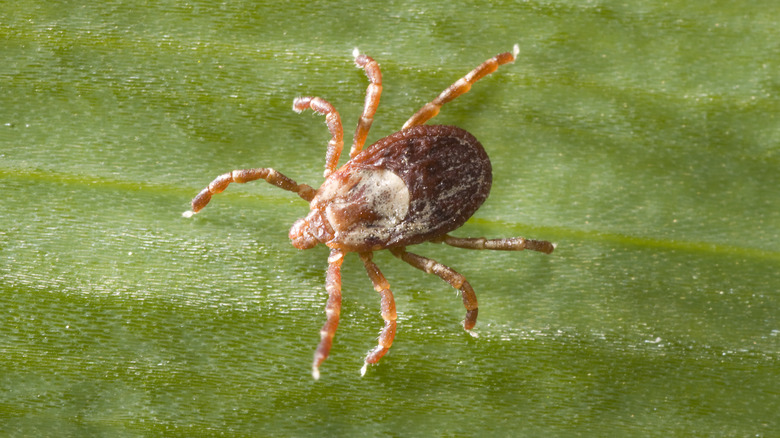Why Do People Use Garlic As A Tick-Repellent (& Does It Actually Pack A Punch)?
Tick bites aren't just unpleasant and creepy. According to the Centers for Disease Control and Prevention, they can also spread a host of gnarly diseases, including Lyme disease, babesiosis, Rocky Mountain spotted fever, and more. Ticks can't jump or fly, so most follow an ambush strategy to find their hosts, waiting patiently on the tips of grass and branches until some unlucky victim brushes by and they can latch on.
Commercial tick repellents are widely available and generally effective, but many people would prefer to reach for a natural solution, especially if they must go outdoors often. Some say that using garlic is a tip for keeping ticks out of your yard. If ticks can smell your garlicky aroma, will they still want a bite? Research shows that some key compounds in garlic will repel ticks, causing them to crawl far away to escape the strong scent, but overall, you shouldn't depend on garlic as a reliable means of protection. Here's what the research says about using garlic oil to repel ticks and the best ways to actually protect yourself from these blood-sucking arachnids.
Garlic oil shows some promise, but isn't reliable enough
To be fair, this popular myth comes with a grain a truth; ticks do seem to have some aversion to garlic. In a study published by the Journal of South African Veterinary Association, dichloromethane extracted from garlic bulbs was shown to be very effective at repelling hard-bodied ticks. Although the study suggests some further experiments are needed, both male and female ticks were repelled by the extract up to 87% and 87.5%, respectively. Of course, laboratory studies don't always play out the same way in the real world. The efficacy of garlic as a tick repellent depends heavily on the strength of the garlic compounds and the method of use.
For example, eating lots of garlic isn't necessary or helpful for preventing tick bites, as a study published in The Journal of the American Medical Association found soldiers who consumed garlic pills weren't much more protected from ticks than soldiers who took a placebo. Not many studies exist to test how well garlic might repel ticks when applied directly to skin or clothing — but then again, who would want to reek of garlic all day when less offensive options are available? More commonly, you can use lawn and garden sprays containing garlic oil to stop ticks from taking over your lawn. Garlic oil-based pesticides applied directly to the lawn can successfully reduce ticks temporarily, especially if applications are repeated.
Garlic stinks; try these other methods
In theory, garlic could repel ticks, but it hasn't been researched enough to be a trusted and effective tick repellent — it's not worth the risk of contracting a serious, potentially chronic illness like Lyme disease. There are better ways to protect yourself from ticks, even if you don't want to use chemical repellents. Oil of lemon eucalyptus is synthetically concentrated from natural plant sources, and shows great promise for repelling ticks up to 2-5 hours after application. After spending time outdoors, shower within two hours and always check yourself and your companions for ticks.
Other chemical-free solutions for for killing and repelling ticks just take a little forethought and planning. Tick bites can happen any time of year, but if possible, avoid going into brushy or wooded areas during their peak seasons, usually from April through September. If you're going into the woods or tall grass, wear long sleeves and pants and tuck the hem of your pants into a pair of boots. Ensure that the area around your home stays relatively tick-free by clearing out any brush, tall grass, and leaf piles, especially around pathways and porches. For extra protection in extremely tick-populated areas, create a 3-foot barrier of cedar wood chips between brushy areas and your lawn and apply a pesticide spray to drive ticks away.


